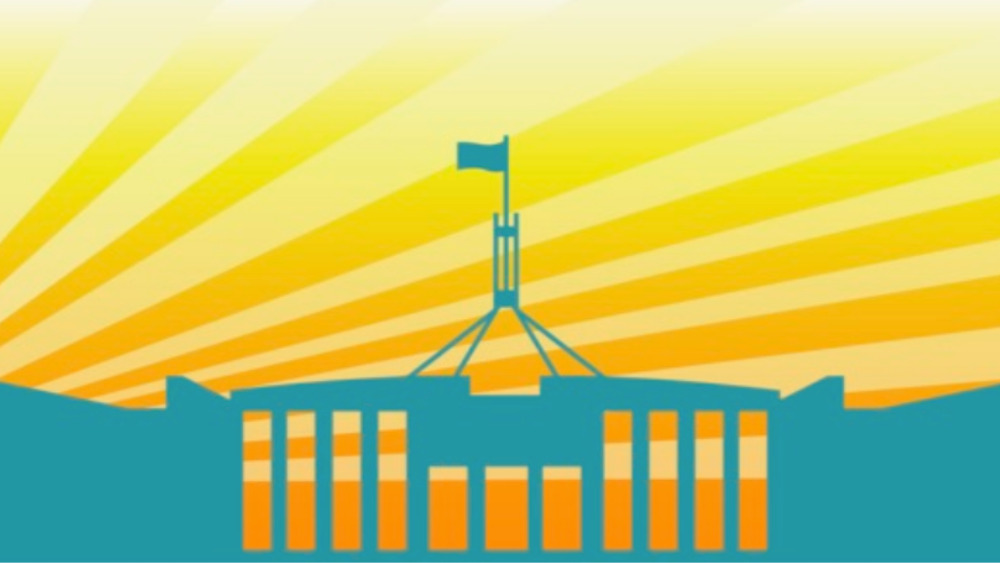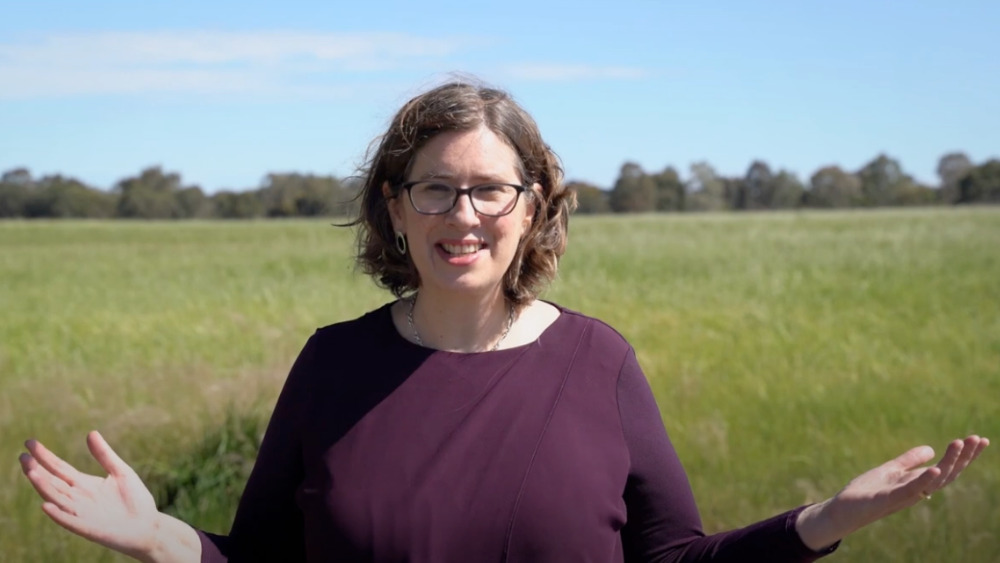Close your eyes for a few seconds and picture yourself doing something for your own wellbeing … That was the challenge Jenny George gave participants at the 2021 National Prayer Breakfast, which was held online this morning.
“What did you choose? What was that picture?” asked the CEO of Converge International, a corporate mental health provider that supports over two million Australian workers.
“Was it reading a favourite book? Was it listening to music? Did you treat yourself? Or did you picture yourself volunteering at an op shop? Did you think about coaching seven-year-olds to play soccer? Was that what you chose to do for your wellbeing?”
“The best way to love yourself is to love others.”
George was the keynote speaker at the event, which was also addressed by Governor-General David Hurley, Prime Minister Scott Morrison, Opposition Leader Anthony Albanese along with other MPs and senators, and members of the military, medical and school communities.

Copyright National Prayer Breakfast
George, who described herself as a mathematician who works in mental health, says the experiment shows that sometimes we don’t know what’s good for us.
“A Californian researcher got a result she didn’t expect. She asked one group of people to do something for themselves and another group of people to do something kind for someone else. The group that did something for someone else had higher increases in wellbeing sustained over more time than the group that chose to treat themselves and even boosted their immune system,” she says.
“The best way to love yourself is to love others. Good mental health is built on good character. But good character Isn’t something you’re born with. It’s learned and practised and cultivated, and sometimes we need help getting breakthroughs.”
Giving an account of her personal journey, George said it was a story of a mathematician finding purpose and one of a Christian finding her calling.
“Sensible, profitable commercial decisions will be morally right decisions.”
After gaining her PhD in applied maths, she taught students how to apply data to make good commercial decisions at Melbourne Business School for nearly 16 years.

Jenny George speaks to participants at the National Prayer Breakfast
“The two biggest things though, that happened to me in that job happened about the same time I became Dean of the school and the global financial crisis hit. Suddenly people woke up to the fact that database decisions are no good if they’re not ethical.
“I spent much of my years as Dean talking to newspapers and students and business people about business education. But I wasn’t asked about my specialist subject of database decisions. They didn’t want to know about the maths, they wanted to know about ethics. The problem of the day was how to train students to be ethical. The key theme that I emphasised during that time was good business is good business, by which I meant sensible, profitable commercial decisions will be morally right decisions. A reputation for treating everyone honestly, even your competitor, will ultimately lead to better business outcomes.
“It was curious though, ethical practices were all the rage, but ethics was a much more popular word in business circles than character. And you almost never heard anyone talk about virtue. Business people were fine to talk about the rightness or wrongness of an action, but reluctant to talk about issues of the heart.”
So she made a leap out of the world of business education into commerce, having developed a thirst to put into practice her belief that seeking the good of the people in a company, its customers and everyone else will build “a business that’s sustainable and profitable that we can be proud of.”
Converge, while a strong commercial enterprise, was a workplace full of people who were not just doing okay but actually flourishing, she said.
“And I feel that I found the purpose that I was seeking way back in high school because now I still do maths modelling and I love it. And I still think about database decision-making, but I know that the things I’m modelling, the decisions I play a part in result in transformed lives,” she explained.
“I’m humbled by the many stories I hear every day, exhausted aged care workers who were terrified that they would catch COVID and spread it to their families and our people help them keep going; a postal worker in chronic pain off work for six months, hopeless because she couldn’t see an end in sight – no idea if she would ever work again. We got her back to work – the pain didn’t go away, but working with purpose again transformed her life.”
“All the threads of my life have come together.”
George says almost every week she hears moving stories of people who confess that they don’t think they would still be around if not for their counsellor.
“These little victories and big victories encourage me every day. And I feel in some ways that all the threads of my life have come together in the content of what we’re doing as well,” she said.
Teaching ethics wasn’t enough to put all the pieces together, she said. An ethical formula couldn’t make someone want to be good.
“You can’t hope that good decisions will come by giving someone a checklist that they run through before taking an action. People aren’t like that; decisions aren’t like that. Decisions come from the heart. What I’ve seen as I manage my company is that there is a virtuous circle of work; good businesses cause their people and their clients to flourish and flourishing human beings make for good businesses. I’m now convinced that flourishing human beings and ethical business people are actually one and the same.”
She said working in mental health had shown her that good character is not only the foundation of ethical decisions but also of good mental health.
She cited the work of psychologist Martin Seligman, considered the father of positive psychology, who wrote a book called Character Strengths and Virtues.
“He links to the traditional religions found across all the ancient cultures of the world and shows how they lay the foundations that good mental health is built on. That’s important because I think that sometimes we think about this the wrong way,” she said.
She had been working with a colleague to build a model of mental fitness, exploring all the habits that help people stay fit mentally fit. Just like cardio exercise is important for physical fitness, exercises for your mind such as a positive mindset, sleeping well, and volunteering your time are important for mental fitness.
“I remarked to my colleague that many of these mental fitness exercises that we were discovering were things that people used to get from going to church,” she noted.
“And I wondered whether our modern, not so church-going society had actually found good replacements for them. When thanking God before every meal has gone, have we lost the habit of gratitude? Where looking forward to an eternal future no longer happens every Sunday, have we lost the habit of hope? When donating money and our time sacrificially is no longer expected of us, have we lost the habit of giving? I think this intertwining of mental health and spiritual health might be why there is such good evidence to show that counselling that embraces the whole of a person, including their religious beliefs, leads to the best mental health outcomes for them; working with every person and their unique spiritual beliefs can be incredibly powerful and effective for their mental health.”
“Working with every person and their unique spiritual beliefs can be incredibly powerful and effective for their mental health.”
While generally a resilient person, George confessed that she had felt knocked around by COVID and its restrictions and she had found herself becoming more irritable than she had ever been.
“It’s changed our habits and undermined our mental fitness. It’s challenged our sense of hope and questioned our purpose. COVID the illness and the measures we’ve taken to control it are a mental health challenge and a spiritual health challenge.
“Part of spiritual health is patience; part of mental health is patience. I usually walk to work, but in lockdown, I walked down the stairs sometimes to the kitchen.
“Yet part of spiritual health is caring for my body. Part of mental health is caring for my body. COVID has led to mental health issues and to spiritual health. As I think about the work my colleagues do, I’m reminded that Christians are asked to be continually transformed more and more into the likeness of God. We look after our minds and our bodies so we can do God-like things.”
“Good mental health goes hand in hand with the virtues that Jesus teaches us to cultivate as Christians.”
And, she reminded her audience, we know what God is like and what godly people are like thanks to Galatians 5:22. “They are people full of love, joy peace, patience, kindness, goodness, faithfulness, gentleness, and self-control.
“And isn’t that what we all want? When you think about it, there’s no one who comes to a counsellor to make them more impatient. There’s no one looking to become less joyful. There’s no one looking for more conflict in their lives. Good mental health goes hand in hand with the virtues that Jesus teaches us to cultivate as Christians.
“That’s the way we’re made to be. But the passion for human flourishing is becoming like the God who created us in his likeness. Every counsellor works with someone to achieve a little bit of change to be made more like what we’re meant to be. I mentioned more self-control, a dollop more gentleness, a sense of peace.
“And that’s why I’m so sure that working in mental health is fundamentally good. I’m not a trained mental health professional. I’m still a mathematician trying to help out in any way I can with my spreadsheets and my database decisions. Trying to enable these little victories to happen. But now I’m a Christian who’s found her calling; I’m a mathematician with purpose.”
Pray
Some prayer points to help
Pray for the mental and spiritual health of our nation and ask God how we can fulfil our own calling and purpose.



